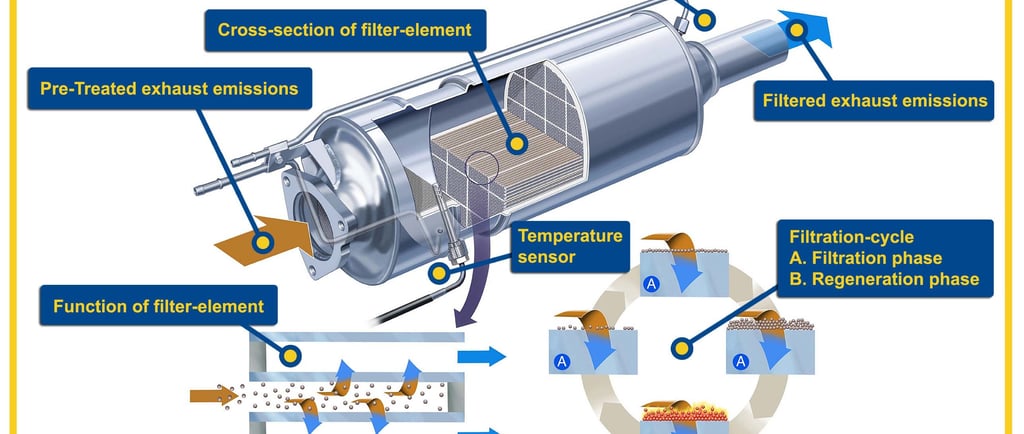Understanding DPF: Full Working and Benefits in Diesel Engines
1/19/20252 min read


Introduction to Diesel Particulate Filters
Diesel engines have gained popularity due to their efficiency and power. However, they produce particulate matter, which poses environmental challenges. To tackle this issue, many modern diesel engines are equipped with Diesel Particulate Filters (DPF). This blog post explores the workings and benefits of DPF in diesel engines.
How DPF Works in Diesel Engines
The primary function of a DPF is to capture and store soot and other particulate matter generated during the combustion process in diesel engines. The filter is typically made of porous ceramic materials that trap these particles while allowing gases to pass through. As the engine operates, the collected soot eventually leads to increased back pressure, signaling the need for regeneration.
Regeneration is a critical process in the operation of a DPF, wherein the trapped soot is burned off to restore the filter's efficiency. This process can occur passively when the engine reaches a certain temperature or actively initiated by fuel combustion to increase temperatures within the filter. Regular regeneration ensures that the DPF continues to function optimally, reducing the risk of engine performance issues.
Benefits of DPF in Diesel Engines
The implementation of DPF technology in diesel engines brings several benefits. Firstly, it significantly reduces harmful emissions, aligning with stricter environmental regulations. By trapping and oxidizing particulate matter, DPFs help in achieving lower particulate emissions, contributing to cleaner air quality.
Moreover, equipping diesel engines with a DPF can enhance fuel efficiency. With reduced back pressure and optimized combustion processes, the engine can operate more efficiently, ultimately improving fuel economy. This not only benefits the environment but also translates to cost savings for consumers.
Additionally, having a functioning DPF system can enhance the overall performance and lifespan of the diesel engine. By minimizing the build-up of soot and preventing engine wear, a well-maintained DPF can extend the intervals between maintenance checks, saving both time and expenses for the vehicle owner. Furthermore, many manufacturers provide warranties for vehicles equipped with DPFs, indicating their reliability and long-term benefits.
In conclusion, understanding the full workings and advantages of Diesel Particulate Filters in diesel engines is essential for both manufacturers and consumers. As the automotive industry continues to evolve towards sustainable practices, ensuring that diesel engines comply with environmental regulations while maintaining efficiency will be critical. Embracing DPF technology is a significant step towards achieving these goals.
Support
Ask questions and share truck repair tips.
Connect
© 2025. All rights reserved.
